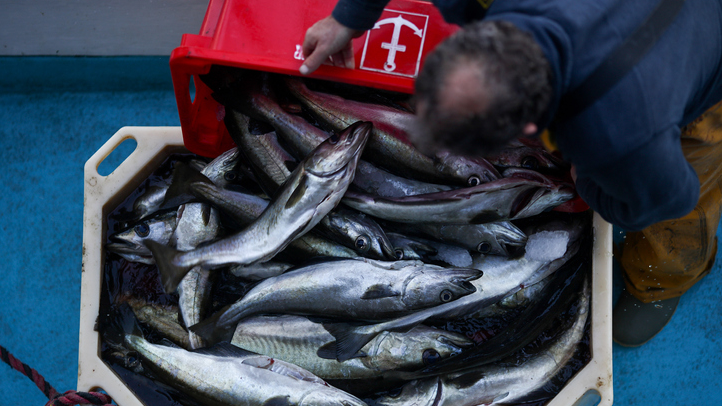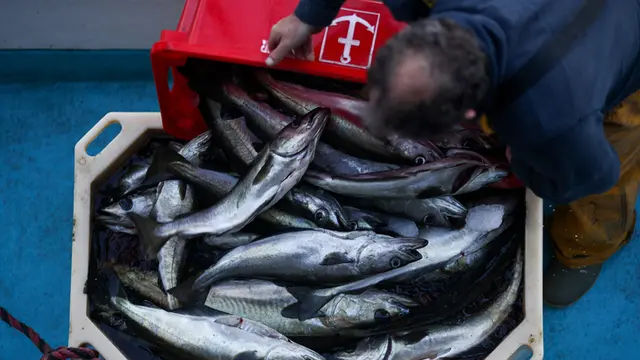
/Getty
Editor's note: Richard Fairchild is an associate professor of finance at the School of Management, University of Bath. The article reflects the author's opinions, and not necessarily the views of CGTN.
Just one month remains until Britain officially leaves the EU, with or without a deal, on January 1, 2021. Britain and the EU have just conducted a weekend of fruitless talks in London to try to come to a mutually agreed upon deal. According to ITV news, "the weekend of Brexit talks end with no breakthrough as 'poisson' remains the sticking point."
Indeed, the weekend talks between the respective EU and British chief negotiators, Michel Barnier and Lord David Frost focused on fishing rights. When Barnier was asked about progress, when leaving the meeting on Sunday evening, he simply replied "poisson," the French term for fish.
In my opinion, the fact that so much time and energy is being expended on negotiating fishing rights issue is symbolic of the prolonged, protracted Brexit negotiations as a whole throughout 2020.
Both sides have been pushing the boundaries and parameters of all aspects of the deal to the limit, with many "bargaining games" being played along the way on both sides.
Academic bargaining theory and practical observation shows that the framing of negotiations can crucially affect outcomes.
Negotiations can be conducted in a spirit of mutual cooperation, recognizing that bargaining is a matter of mutual respect, and give and take. In this case, deals can be concluded quickly and easily to the satisfaction of both sides.
On the other hand, negotiations can be framed as adversarial, conducted with hostility and bitterness. Each party acts in a self-interested way, out to get what they can at all costs, with no consideration of the interests of the other side, and no understanding of the rival's position.
Throughout 2020, the EU and Britain have adopted a hostile, non-cooperative tough bargaining stance, with neither side prepared to be seen to "give an inch."
Of course, the negotiations have been made all the more complex due to the fact that these parties are negotiating over many issues: game theory demonstrates that achieving a deal can become more complex as the number of issues on the table increases.
On the other hand, an academic research by Professor Brams (the theory of fair division) shows that an increase in the number of issues can actually improve the chances of a deal, as cooperative, fair-thinking parties are prepared to think holistically, consider the whole package and trade-off various issues: "I will give way, and give you what you want on issue X, if you give me what I am asking for on position Y."
In my opinion, the negotiations in 2020 were never going to be conducted in this fair-thinking spirit. The EU and Britain have each taken the self-interested stance and have not been prepared to give and take on any issue: It has been a matter of 'face-saving' and winning at all costs on every issue. This can now be observed in this, potentially the final weekend of negotiations, with focus on the issue of fishing rights.

EU Brexit negotiator Michel Barnier (C) walks with members of the EU delegation to the Department for Business, Energy and Industrial Strategy in St. James, London, UK, October 28, 2020. /Getty
The UK Foreign Secretary Dominic Raab, speaking on the Sky Television program "Sophy Ridge on Sunday," urged the EU to recognize "the point of principle" on Britain's control of its waters.
He suggested that the UK had achieved on the position of the level "playing field." Now the EU must recognize the importance of fishing rights, particularly as Britain is a coastal nation. The adversarial tone becomes clear when the ITV website reports that "the UK has called on the EU to concede on fishing rights... fishing rights remain an 'outstanding bone of contention.'"
Indeed, the EU has attempted to make a major concession: Michelle Barnier has said that the EU could accept a 15-18 percent reduction in the EU's share of fishing rights in UK waters.
The UK government has responded that "these figures are risible, and the EU side knows full well that we would never accept this."
The UK government official adds that the EU fails to understand the scale of change needed on fishing rights for the UK to become an independent nation.
The Daily Express' report on November 30 reflects the adversarial tone, in its front page piece, headlined "Brexit VICTORY looms as EU braces for defeat- Barnier 'TEMPTED' to agree UK deal." The Express reports that Barnier has sparked panic and fury among EU diplomats, who fear that he might be tempted to make major concessions to the UK on fishing rights.
Prime Minister Boris Johnson has made it clear that the UK is prepared to leave without a deal on January 1, 2021. This 'final' issue of fishing rights is symbolic of the game-playing and brinkmanship that has been played by both sides on all of the issues throughout 2020.
It will be interesting to observe whether Britain is prepared to push this to the limit and leave without a deal on January 1 for the sake of one issue, fishing rights!
(If you want to contribute and have specific expertise, please contact us at [email protected].)
 简体中文
简体中文




